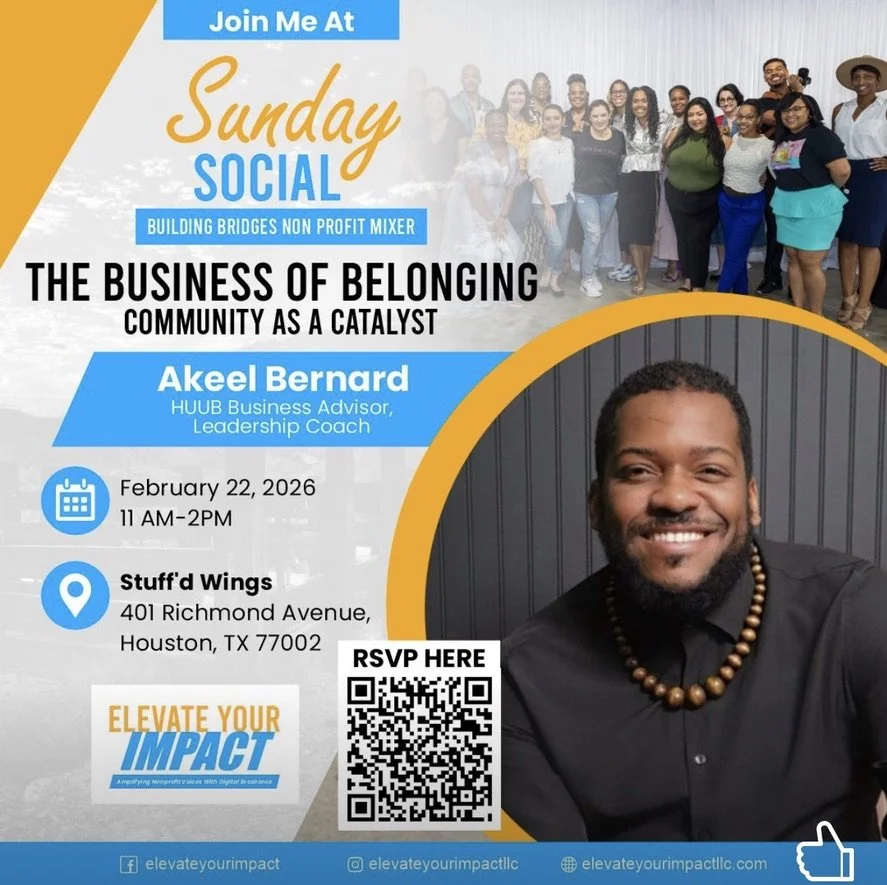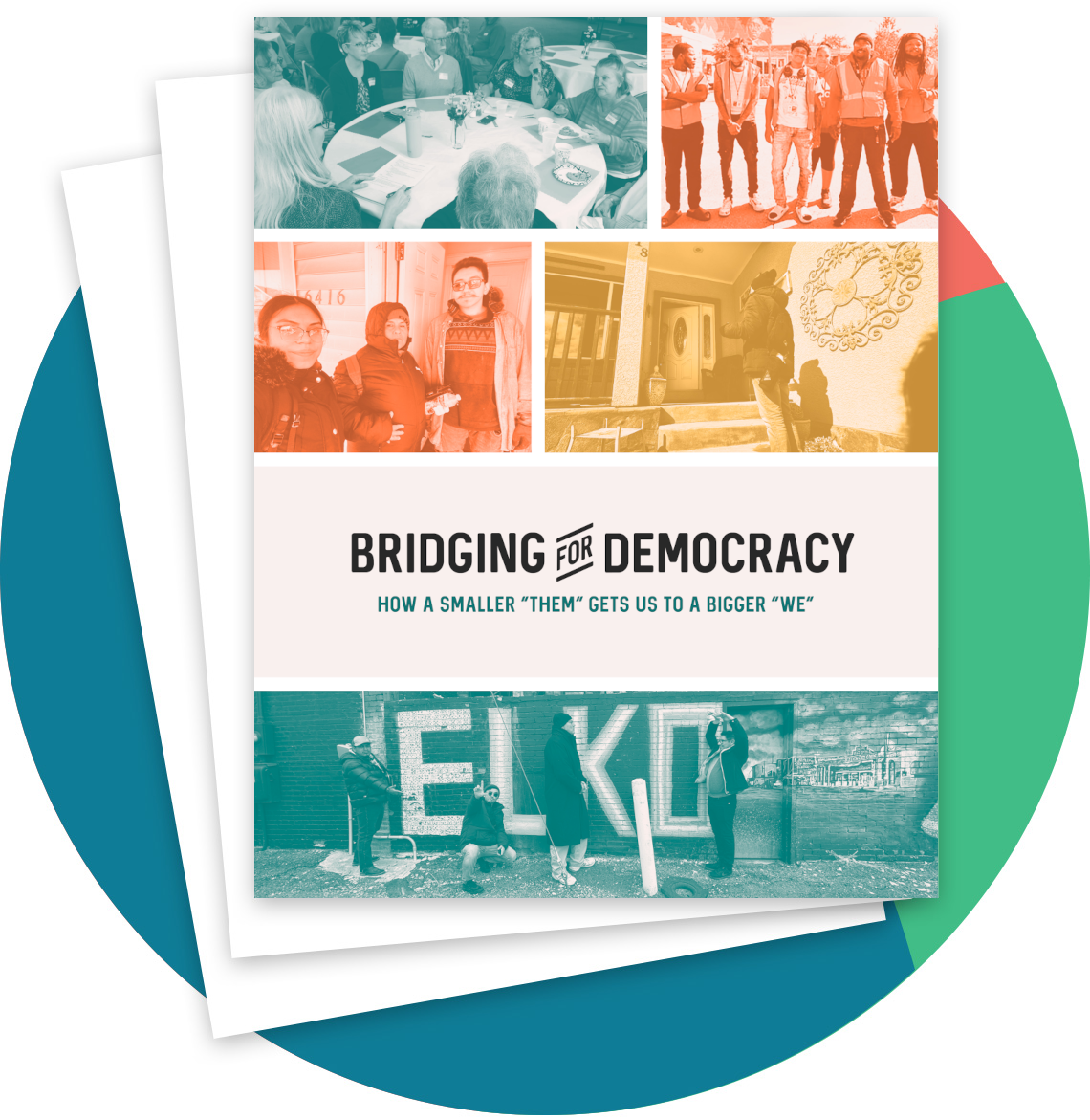
Feb 22nd Sunday Social: Building Bridges Nonprofit Mixer
Join us for another Sunday Social: Building Bridges Nonprofit Mixer—a brunch-and-learn experience designed for nonprofit leaders, community organizers, and purpose-driven professionals ready to amplify their impact.
This quarter's theme, "The Business of Belonging: Community as a Catalyst," explores how building authentic community connections can transform your organization's reach and effectiveness.
What to expect:
Brunch and networking with nonprofit founders and community leaders
Panel discussion with experienced Houston changemakers
Interactive conversations to help strengthen your voice and mission
Connections that spark collaboration and drive growth
Bridging for Democracy
"Today's growing division and dehumanization cannot just be countered by amassing more forces on one side. We see the act of bridging and listening across differences as critical for the progressive movement to meet this moment."
— Othering and Belonging Institute, UC Berkeley
Measuring Love in the Journey for Justice: A Brown Paper
This paper calls on love as a cure for injustice. It is not a formal research paper. It comes from the heart. It is meant to be used—like love itself. It is meant to start talks and make us think.
Together for Democracy Resource Hub
Together for Democracy Resource Hub
Build community, find courage, and advance democracy by hosting a Dinner for Democracy or Coffee for Change. Get everything you need to gather friends, neighbors, and colleagues for meaningful conversations and collective action.
The Mayor Who Made Compassion His Mission
Charter for Compassion launches "With Compassion," a new podcast series exploring how compassion can transform politics and civic life. The debut episode features Greg Fischer, who served 12 years as Mayor of Louisville, Kentucky—making compassion one of his city's three core values.
Constructive Dialogue Institute Webinar Series
These four webinars from the Constructive Dialogue Institute give college leaders, educators, and student organizers practical tools for building campus cultures where people can talk across differences. Learn from real examples at leading universities.
What This Series Offers
Research-backed strategies from leading universities
Practical tools you can use right away
Real examples from campus dialogue programs
Expert guidance from university leaders
Free recordings you can watch anytime
One Small Step
One Small Step
Let's Talk For A Change
Have a real conversation with someone who sees the world differently than you do. No debates. No arguing. Just two people getting to know each other as human beings.
A StoryCorps initiative bringing together people with different political views for 50-minute conversations that remind us of our shared humanity.
Designing Impactful Campus Speaker Events
Campus speaker events can be flashpoints for division—or opportunities for real learning. This playbook gives organizers practical tools to design events that bring people together across differences, even when discussing tough topics.
What You'll Learn
How to design events that encourage dialogue instead of debates
Ways to set the right tone before, during, and after controversial speakers
Practical steps for choosing speakers who model good conversation
Tools for creating safe spaces where all students can participate
Methods for turning disagreement into learning opportunities
Stories to Lift Your Spirit
In times of uncertainty and challenge, human connection becomes our greatest strength. StoryCorps brings together heartwarming stories that remind us of our shared humanity, resilience, and capacity for love and kindness.
StoryCorps is one of the largest oral history projects of its kind. Since 2003, StoryCorps has collected and preserved more than 75,000 interviews from people of all backgrounds and beliefs. These conversations celebrate the power of listening and remind us what matters most in life.
Living room Conversations
"I've experienced a number of times where I found myself thinking, 'Oh I never thought of it that way' or I recognized that someone else's experience opened me up to a new way of seeing that topic. I found myself seeing something for the first time."
— Conversation Participant
Episode 1: Reclaiming Civic Culture
The Beacon Project launches its first podcast with Eric Liu, CEO of Citizen University. This conversation explores why citizenship matters now, what civic culture really means, and how communities can rebuild connection in times of division.
How to Disagree Better? A Guidebook.
"Avoiding difficult conversations won't bring us any closer, but treating others with respect will. Learning to discuss and disagree without being mean is the only way to rebuild our communities."
— Disagree Better Initiative
Disagree Better
"We can disagree and stand firm for our beliefs and principles, but we should never forget the dignity of the other human being. I'm proud to join Governors across the nation in demonstrating that civility is not a weakness."
— Governor Bill Lee, Tennessee
The Walrus Talks at Home
How do the places where we gather shape how we connect? From housing to green spaces, public libraries to digital forums, the environments around us play a vital role in fostering belonging and community.
Across the Political Divide, Parents Sound the Alarm on Kids’ Online Safety
In a rare moment of agreement across party lines, parents from all political backgrounds share deep concern about the impact of social media and smartphones on their children. This is not a left issue or a right issue. This is a parent issue.
Why This Matters for Your Community
For Parents: You are not alone in your concerns. Data showing overwhelming consensus across political lines
For Schools: Evidence supporting phone-free policies that most parents actually want
For Policy Makers: Rare bipartisan issue where Americans agree on the need for action
For Tech Companies: Clear signal that parents want better protections for kids online
For Communities: A unifying issue that can bring people together across differences
















